|
|
|
Sort Order |
|
|
|
Items / Page
|
|
|
|
|
|
|
| Srl | Item |
| 1 |
ID:
086938
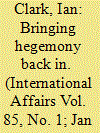

|
|
|
|
|
| Publication |
2009.
|
| Summary/Abstract |
Hegemony suffers from a bad press. It is currently used to refer simply to United States primacy. Thus presented, the US is considered to have been hegemonic since 1945, or at least since 1990. Instead, hegemony is presented here as a legitimate institution of international society in which special rights and responsibilities are conferred on the hegemon. No such hegemony exists at present. However, given today's constellation of power, a circumscribed US hegemony potentially has a distinctive contribution to make to contemporary international order. To map out such a hegemonic institution, this article reviews some historical precedents. It finds that, rather than uniform, these have taken a variety of forms, especially with respect to the scope of the legitimacy and constituency within which they have operated. A scheme of hegemonies-singular, collective and coalitional-is set out as a more realistic way of thinking about hegemony's present potential.
|
|
|
|
|
|
|
|
|
|
|
|
|
|
|
|
| 2 |
ID:
037734


|
|
|
|
|
| Publication |
Oxford, Clarendon Press, 1989.
|
| Description |
263p.
|
| Standard Number |
0198275412
|
|
|
|
|
|
|
|
|
|
|
|
Copies: C:1/I:0,R:0,Q:0
Circulation
| Accession# | Call# | Current Location | Status | Policy | Location |
| 031455 | 355.033541/CLA 031455 | Main | On Shelf | General | |
|
|
|
|
| 3 |
ID:
102653
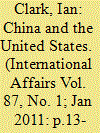

|
|
|
|
|
| Publication |
2011.
|
| Summary/Abstract |
This article critically reviews the suggestion that we are experiencing a 'succession of hegemonies' from the United States to China. It develops Martin Wight's writings on hegemony, and introduces a fundamental distinction (not made by Wight) between a power transition and a hegemonic succession. Wight held complex views about the nature of power and at times seemed to subscribe to a purely materialist account. Elsewhere he was more nuanced and appealed to the purpose of dominant states as part of his argument that influence does not correlate exactly with mass and weight. This suggestion is developed in the author's view of hegemony-as distinct from primacy-as denoting a legitimate practice within international society. These ideas are then superimposed upon current debates about a power transition, or a succession of hegemonies, as between the United States and China. The existing debate conflates those two issues. Accordingly, while it can readily be acknowledged that there are important indicators of a shift in the material distribution of power, this in no way amounts, as yet, to any kind of hegemonic succession. For the latter to occur, there would need to be clear evidence of an effective socialization of the aspirant hegemon's purpose and support for its preferred order. On the contrary, to date China has been largely content to operate within existing frameworks, rather than instigate a revision of them, and does not yet present a model for emulation elsewhere. It is possible that a power transition, without any hegemonic succession, could be corrosive of global governance.
|
|
|
|
|
|
|
|
|
|
|
|
|
|
|
|
| 4 |
ID:
006475
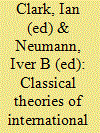

|
|
|
|
|
| Publication |
Houndmills, Macmillan, 1996.
|
| Description |
xii,167p.
|
| Standard Number |
0333650062
|
|
|
|
|
|
|
|
|
|
|
|
Copies: C:1/I:0,R:0,Q:0
Circulation
| Accession# | Call# | Current Location | Status | Policy | Location |
| 038158 | 327.101/CLA 038158 | Main | On Shelf | General | |
|
|
|
|
| 5 |
ID:
049043


|
|
|
|
|
| Publication |
Oxford, Oxford University Press, 1997.
|
| Description |
x, 220p.
|
| Standard Number |
0198781660
|
|
|
|
|
|
|
|
|
|
|
|
Copies: C:1/I:0,R:0,Q:0
Circulation
| Accession# | Call# | Current Location | Status | Policy | Location |
| 039253 | 327/CLA 039253 | Main | On Shelf | General | |
|
|
|
|
| 6 |
ID:
036864
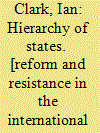

|
|
|
|
|
| Publication |
Cambridge, Cambridge University Press, 1989.
|
| Description |
viii, 253p.
|
| Series |
Cambridge studiesin International relations
|
| Standard Number |
0521372526
|
|
|
|
|
|
|
|
|
|
|
|
Copies: C:1/I:0,R:0,Q:0
Circulation
| Accession# | Call# | Current Location | Status | Policy | Location |
| 031477 | 327.09/CLA 031477 | Main | On Shelf | General | |
|
|
|
|
| 7 |
ID:
092041
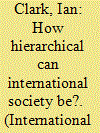

|
|
|
|
|
| Publication |
2009.
|
| Summary/Abstract |
Waltzian analysis proceeds from the distinction between the ordering principles of anarchy and hierarchy. This raises the large question whether the introduction of pockets of 'authority' would represent a fundamental challenge to an anarchical international society. The article investigates this theme by exploring a putative institution of hegemony. It begins with a distinction between primacy and hegemony, and develops the idea of hegemony as a potentially legitimate practice of international society. Since most political systems are 'mixed', it then concludes that adoption of a hierarchical principle of hegemony is no more contradictory for international society than is its development of other such institutions. In common with much recent scholarship, it agrees that international society can function as a form of 'hierarchy under anarchy', within which hegemony could play its part. The article finally demonstrates what is distinctive to hegemonic behaviour, and suggests that practices such as soft balancing do not represent any form of balancing at all, but are better understood as attempts to institutionalise hegemony.
|
|
|
|
|
|
|
|
|
|
|
|
|
|
|
|
| 8 |
ID:
033300
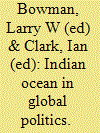

|
|
|
|
|
| Publication |
Boulder, Westview Press, 1982.
|
| Description |
xi, 260p.
|
| Series |
Westview's special studies in International relations
|
| Standard Number |
0865310386
|
|
|
|
|
|
|
|
|
|
|
|
Copies: C:1/I:0,R:0,Q:0
Circulation
| Accession# | Call# | Current Location | Status | Policy | Location |
| 021508 | 327.1824/BOW 021508 | Main | On Shelf | General | |
|
|
|
|
| 9 |
ID:
133956
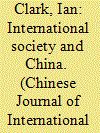

|
|
|
|
|
| Publication |
2014.
|
| Summary/Abstract |
The core suggestion of this article is that we make best sense of the concepts of power, legitimacy, and responsibility within a framework of international society. This framework is illustrated by, and applied to, the specific case of China's rise. In the light of its historical background, a rising China faces a major paradox. Seemingly, the prerequisite for it to exercise greater influence on the norms of international society is yet further assimilation into them: in order to become a respected norm maker, China must first be seen to be fully integrated as an appropriate norm taker. To be in a position to influence the norms of international society, China must seemingly firstly resolve any lingering ambiguities about its membership. In short, should the debates about China's status be understood as an expression of the power of norms (where China is assessed relative to some universal standard of responsibility), or are they better viewed as the deployment of the norms of power in such a way as to impact its social distribution to China's disadvantage (by imposing the self-interested standards of the liberal states)?
|
|
|
|
|
|
|
|
|
|
|
|
|
|
|
|
| 10 |
ID:
051657


|
|
|
|
|
| Publication |
Dec 2003.
|
| Summary/Abstract |
This is a study of legitimacy in a global order, not legitimacy of the global order. It explores the challenging issue of what legitimacy might mean within such a context, and on what basis that order could develop its own principles of legitimacy. Its purpose is to garner further insights into the nature of contemporary global governance, and resistance to it, inasmuch as the latter is widely deemed to be symptomatic of the legitimacy crisis at its heart. A multitude of writers, working from quite different perspectives, is in agreement that it is this lack of legitimacy that threatens the very fabric of the order. Indeed, it is common to regard the emergence of concerns about the declining legitimacy of any system as itself indicative of some kind of failure within it: the concept tends to be associated with the 'politics of crisis'. Accordingly, we are most likely to ask questions about the legitimacy of a system only when things appear to be going wrong. If this is so, legitimacy provides a vital key to understanding the tensions within the contemporary global order.
|
|
|
|
|
|
|
|
|
|
|
|
|
|
|
|
| 11 |
ID:
031547


|
|
|
|
|
| Publication |
Oxford, Martin Robertson, 1982.
|
| Description |
266p.
|
| Standard Number |
0855204834
|
|
|
|
|
|
|
|
|
|
|
|
Copies: C:1/I:0,R:0,Q:0
Circulation
| Accession# | Call# | Current Location | Status | Policy | Location |
| 020843 | 355.0217/CLA 020843 | Main | On Shelf | General | |
|
|
|
|
| 12 |
ID:
041381


|
|
|
|
|
| Publication |
Boulder, Westview Press, 1985.
|
| Description |
146p.
|
| Standard Number |
0813370493
|
|
|
|
|
|
|
|
|
|
|
|
Copies: C:1/I:0,R:0,Q:0
Circulation
| Accession# | Call# | Current Location | Status | Policy | Location |
| 026503 | 355.0217/CLA 026503 | Main | On Shelf | General | |
|
|
|
|
| 13 |
ID:
037516
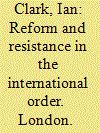

|
|
|
|
|
| Publication |
London, Cambridge University Press, 1980.
|
| Description |
v, 202p.
|
| Standard Number |
0521229987
|
|
|
|
|
|
|
|
|
|
|
|
Copies: C:1/I:0,R:0,Q:0
Circulation
| Accession# | Call# | Current Location | Status | Policy | Location |
| 019278 | 327.17209/CLA 019278 | Main | On Shelf | General | |
|
|
|
|
| 14 |
ID:
077891


|
|
|
| 15 |
ID:
153845


|
|
|
|
|
| Summary/Abstract |
The laws of war are under mounting pressure and yet recent developments in the ethics of war have encouraged a growing disjunction between ethics and the law. Is this a problem, and does just war have a responsibility to address it? How then should we think about the relationship between ethics and law in war? Focusing on the debates between orthodox and revisionist theorists about principles of liability and immunity in war, I argue that these are actually about competing conceptions of justness. Revisionists privilege a ‘best ethics’ approach to justness, whereas orthodox theorists tend to work within a more rounded conception that embraces the legal and political dimensions of the regulation of war. I argue that there is a danger that those revisionist theorists, despite their impressive ethical innovations, nonetheless operate in a reductive way that does little to assist with the contemporary plight of law, and may inadvertently offer but ‘miserable comfort’ to those caught up in the battlefield. In contrast, the just war tradition generally is rooted in a practice that makes greater allowance for a politically configured concept of war, and takes more seriously the requirement for effective law.
|
|
|
|
|
|
|
|
|
|
|
|
|
|
|
|
| 16 |
ID:
088554


|
|
|
|
|
| Publication |
2009.
|
| Summary/Abstract |
English School (ES) writers have never developed a systematic account of hegemony, and most set out with assumptions that are `antihegemonial'. The writings of Hedley Bull, in particular, appeared to reject any notion of a legitimate hegemony. However, a social theory of hegemony that emphasizes its consensual nature does appear consistent with other ES positions, particularly on the role of the Great Powers. This article excavates an ES theory of hegemony. It develops the argument for hegemony as a potential institution of international society, by analogy with the role of the Great Powers, and by extension of other ES principles. This stresses not just the material power of the Great Powers, but their degree of social recognition. Accordingly, it suggests that such a view of hegemony is no more paradoxical than, say, ES acceptance of war as a similar institution. This fills a major void in ES theory which otherwise has nothing of interest to say about international order in conditions of primacy.
|
|
|
|
|
|
|
|
|
|
|
|
|
|
|
|
| 17 |
ID:
090264


|
|
|
|
|
| Publication |
2009.
|
| Summary/Abstract |
English School (ES) writers have never developed a systematic account of hegemony, and most set out with assumptions that are `antihegemonial'. The writings of Hedley Bull, in particular, appeared to reject any notion of a legitimate hegemony. However, a social theory of hegemony that emphasizes its consensual nature does appear consistent with other ES positions, particularly on the role of the Great Powers. This article excavates an ES theory of hegemony. It develops the argument for hegemony as a potential institution of international society, by analogy with the role of the Great Powers, and by extension of other ES principles. This stresses not just the material power of the Great Powers, but their degree of social recognition. Accordingly, it suggests that such a view of hegemony is no more paradoxical than, say, ES acceptance of war as a similar institution. This fills a major void in ES theory which otherwise has nothing of interest to say about international order in conditions of primacy.
|
|
|
|
|
|
|
|
|
|
|
|
|
|
|
|
| 18 |
ID:
044562
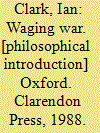

|
|
|
|
|
| Publication |
Oxford, Clarendon Press, 1988.
|
| Description |
154p.
|
| Standard Number |
0198273258
|
|
|
|
|
|
|
|
|
|
|
|
Copies: C:1/I:0,R:0,Q:0
Circulation
| Accession# | Call# | Current Location | Status | Policy | Location |
| 030527 | 355.02/CLA 030527 | Main | On Shelf | General | |
|
|
|
|
|
|
|
|
|